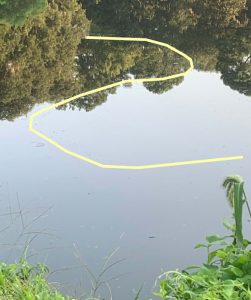Alligator Information from Richard Fitzgerald
Do not feed the wildlife (especially alligator and do not retrieve a golf ball when it lands close to the water's edge (golf balls look like eggs - one of Mr. Gator's favorite foods), supervise your children and grandchildren, keep your pets on a leash, and do not walk them close to the water's edge. Never swim in the lakes and lagoons in HHP and do not let your pet swim in the lakes and lagoons.
If you suspect an alligator may be aggressive, call Security (843-681-2459) and they will make a determination. If the alligator is deemed to be aggressive towards humans it will be removed and destroyed. By law, alligators cannot be relocated from HHP and returned to the wild; they must be destroyed. HHP Security will routinely move (not remove) alligators from roadways, swimming pools, and front and back lawns of private property, and release them in the nearest lagoon. Again, if the alligator shows a healthy fear of humans it will not be removed and destroyed.
Do not harass, taunt, thrown sticks, rocks, or other objects at an alligator, and don't allow your pet to harass them. When your children and grandchildren visit, please teach them these safety and environmental principles. If you see someone feeding or harassing an alligator, call Security and let them investigate and address the situation.
Below are two links to excerpts from the SC DNR website. The first one is from the portion of the DNR website related to Fishing Clinics and Rodeos. Note in the photographs how close to the edge of the pond the children are, and that some of the children sitting down. SC DNR has told me that they have not taken any special precautions against the threat of alligators for the children attending their fishing rodeos. Our club errs on the side of safety by requiring kids to stay several feet away from the lagoon's edge.
The second attachment is from the portion of the DNR website related to Problem (Nuisance) Wildlife. The first page provides a list of different wildlife from which you can select. The second through the sixth pages show what is displayed if you click on “Alligators” from the list. At our last Monday outing, someone asked if alligators scare fish away. My experience has been that they do not. Instead, alligators often force me to leave an area where I am catching fish.
Spotting Alligators
The photo shows a trail of bubbles that were the result of an alligator swimming underwater. Note that it started near the bank and went into deeper water. The bubbles rise out of decaying organic matter (dead fish, dead plant life and other debris – detritus) on the bottom of the pond which was disturbed by the movement of water caused by the alligator swimming.
Alligators have the ability to stay underwater for extended periods of time, sometimes lying on the bottom looking toward the bank. Fisherman should keep this in mind as they walk the banks of ponds. An alligator can lunge about half its length out of the water. A large alligator recently popped its head up at the bank right in front of me. We had this occur several times in one day at Kids Kamp a few years ago, which caused us to start marking a line on the grass which the children should not cross because they would be too close to the water’s edge.